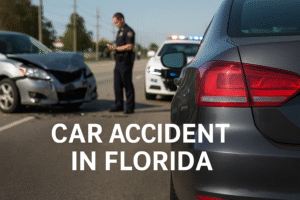
Introduction
If you’ve been in a car accident in Florida, you know how stressful and confusing the experience can be. From dealing with injuries to handling insurance paperwork, the process can be overwhelming. Florida’s unique car insurance laws, including the no-fault insurance system, add another layer of complexity. This article breaks down everything you need to know about car accidents and car insurance in Florida, including coverage requirements, how to file a claim, what to do after a crash, and when to seek legal help.
Florida’s Car Insurance Laws: The No-Fault System
Florida is one of the few no-fault insurance states in the U.S. This means that after a car accident, your Personal Injury Protection (PIP) coverage pays for your own medical expenses and lost wages, regardless of who caused the accident.
Mandatory Coverage
By law, every Florida driver must carry:
-
$10,000 in PIP coverage
-
$10,000 in Property Damage Liability (PDL)
This basic coverage is designed to reduce the number of lawsuits by covering minor injuries through your own insurer.
Optional But Important Add-Ons
To increase protection, many drivers also purchase:
-
Bodily Injury Liability (BIL)
-
Uninsured/Underinsured Motorist Coverage
-
Collision and Comprehensive Coverage
These add-ons help in cases of severe accidents, hit-and-runs, or damage beyond your own policy limits.
What to Do After a Car Accident in Florida
1. Ensure Safety and Report the Accident
Move to a safe area and call the police. A formal report is crucial for your car insurance claim.
2. Gather Evidence
Take pictures, get witness contacts, and record insurance and vehicle information. This helps in supporting your claim and proving fault, if needed.
3. Seek Medical Treatment
Under Florida’s no-fault law, you must receive medical care within 14 days of the accident to be eligible for PIP benefits.
4. Notify Your Insurance Company
File a claim with your insurer as soon as possible. Delays may affect your benefits.
Filing a Car Insurance Claim in Florida
When you file a claim under your PIP coverage, your insurance typically pays:
-
80% of medical bills
-
60% of lost wages
-
Up to $5,000 in death benefits
If you suffer significant injury, you may be able to step outside the no-fault system and pursue compensation through the at-fault driver’s insurance.
Property Damage Claims
If the accident damages another person’s property (vehicle, mailbox, fence), their Property Damage Liability coverage should handle the cost.
When Can You Sue the At-Fault Driver?
Florida limits lawsuits for car accidents to cases that meet certain criteria:
-
Permanent injuries
-
Significant scarring or disfigurement
-
Permanent loss of bodily function
-
Wrongful death
In such cases, you can file a lawsuit for:
-
Pain and suffering
-
Future medical costs
-
Loss of quality of life
This is where having bodily injury liability and a good personal injury lawyer in Florida becomes important.
Statute of Limitations in Florida
You have a limited time to file a lawsuit:
-
4 years for personal injury or property damage
-
2 years for wrongful death
Failing to file within these timeframes can result in losing your legal right to compensation.
Dealing With Insurance Adjusters
When you file a car insurance claim, an insurance adjuster will investigate:
-
The cause of the accident
-
The extent of damages
-
The validity of your medical treatment
Tips for Handling Insurance Companies
-
Do not admit fault.
-
Do not give a recorded statement without legal advice.
-
Keep detailed records of all communications and expenses.
-
Always review settlement offers carefully.
If your claim is denied or undervalued, consult an accident attorney in Florida immediately.
Common Causes of Car Accidents in Florida
Being aware of common causes can help you avoid accidents:
-
Distracted driving (especially texting while driving)
-
Speeding
-
Driving under the influence
-
Heavy rain and storms
-
Failure to yield
Florida is also known for a high number of uninsured drivers, making uninsured motorist coverage an essential add-on.
Why You Should Consider a Personal Injury Lawyer in Florida
A car accident lawyer can help you:
-
Evaluate your case
-
Communicate with insurers
-
Maximize your compensation
-
Represent you in court if needed
They’re especially useful when dealing with serious injuries or insurance disputes.
Tips for Staying Protected in Florida
-
Always carry more than the state’s minimum coverage.
-
Keep your car insurance policy updated.
-
Install a dashcam to document accidents.
-
Drive defensively and avoid distractions.
-
Know your rights under Florida’s no-fault law.
Conclusion
Navigating the aftermath of a car accident in Florida can be challenging, especially when dealing with injuries and complex insurance laws. Knowing what to do, what coverage you need, and when to seek legal help can make a big difference. Florida’s car insurance system, while designed to streamline claims, still requires drivers to stay informed and prepared.
If you’re ever in an accident, understanding your PIP coverage, filing a Florida car insurance claim, and working with a Florida car accident attorney can protect your rights and financial future.
٠١١٢٧٥٦١٢٩٦
حلم حلم حلم حلم حلم حلم يارب
الحمدلله على كل حال داءما وابدا والصلاة والسلام على سيدنا ونبيينا وحبيبنا محمد صلى الله عليه وءاله وصحبه اجمعين وسلم حلم حلم حلم حلم حلم تم تم تم تم يالله يالله يالله ياحي ياقيوم اسالك ان تفتح لي
ابواب رزقك الحلال برحمتك يارحم الراحمين بارك الله فيكم وجزاكم الله خيرا ءااامييين
ايمان محمد احمد عبيده المغربي من مصر 01270871462/ حلم حلم حلم كل انسان يتمنه الافضل في حياتو
الحسين او ركي +2120662542431 من الصحراء المغربية